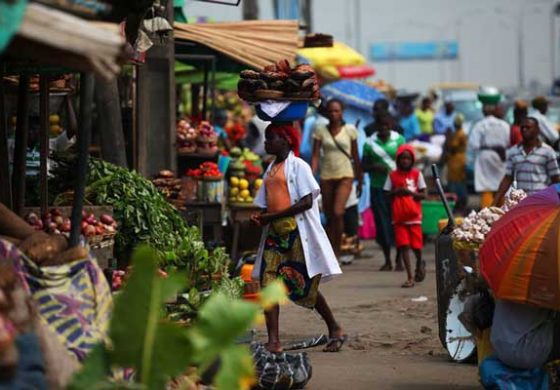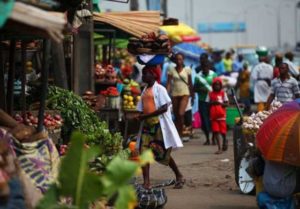Economy
Nigeria’s Consumer Confidence Level Gains 3 Points in Q4 2016—Report


By Modupe Gbadeyanka
A new report released by Nielsen Holdings Plc, a a global performance management firm providing a comprehensive understanding of what consumers watch and buy, has revealed that Nigeria climbed three points to 116 in the fourth quarter of 2016, after a steep decline in the third quarter.
In the latest Consumer Confidence Index (CCI) figures for Quarter 4 of 2016, it was observed that sentiment in the west of Africa is on the increase with Ghana rising by two points to 111.
Managing Director of Nielsen East and West Africa, Mr Abhik Gupta, while explaining the reasons for Nigeria’s improved consumer sentiment in a statement made available to Business Post, stated that, “Despite previous drops in consumer confidence, Nigerians are now more positive than Kenyans, South Africans and Ghanaians, in terms of their job prospects and personal finances and as the country’s macro, business and retail prospects recover we expect to see continued positivity amongst Nigerian consumers.”
Adding to this positive outlook, the latest Nielsen Africa Prospects Indicator (APi), which integrates macro-economic, business, retail and consumer factors points to the fact that predictions are that the worst is over and it will not take much to drive the Nigerian economy into positive growth levels in 2017.
Short term positivity in Nigeria
In light of this, all confidence indicators in Nigeria increased in the fourth quarter. The percentage of respondents who predict that their personal finances will be good or excellent in the next 12 months jumped five percentage points to 80 percent, and 59 percent of Nigerian respondents said job prospects will be good or excellent, up one percentage point from the third quarter.
Immediate-spending intentions increased four percentage points, rising to 39 percent while more than four in 10 Nigerian respondents (44 percent) said they had spare cash, up from 36 percent in the third quarter.
In terms of what they would use this spare cash for, the highest number of Nigerians are seeking to batten down the hatches on their current financial future, with 80 percent saying they would put it into savings.
The second highest number (69 percent) wants to use their spare cash on home improvements and decorating and 62% on investing in shares and mutual funds. Unsurprisingly, 60 percent would spend it on out-of-home entertainment as they seek some respite from their current daily stresses and strains.
Mixed positivity in Ghana’s results
The overall increase in Ghana’s CCI, was due to a higher proportion of “Excellent” responses even though “Good” responses have declined.
This means that despite the positive outlook for jobs dropping two percentage points from Q3 to an overall 55 percent, this was made up of 12 percent saying “Excellent” (up from 10 percent previous quarter) and 43 percent saying “Good”.
This was followed by positive personal-finance sentiment decreasing by one point to 76 percent, of which 23 percent said “Excellent” (up by 4 points) and 52 percent said “Good”.
Immediate-spending intentions dropped by two percentage points to 40 percent of which 10 percent said “Excellent” (up by 4 points) and 30 percent said “Good”.
Less than half of Ghanaian respondents said they had spare cash (47%) – a drop of 3 percentage points from the third quarter, however this proportion of consumers is higher than Nigerians (44 percent) and Kenyans (42 percent).
In terms of what they would use this spare cash for, Ghanaians remain financially conservative in their outlook, with the highest number (82 percent) saying they would put it into savings, the second highest number of respondents 72 percent see home improvements as a worthwhile investment while (59 percent) saying they would invest in shares/mutual funds.
Overall Gupta comments; “In the backdrop of improved confidence levels, businesses need to adjust to the altered daily habits that consumers are displaying to deal with the tough market conditions. As consumers have been forced to reduce consumption, only buying on an immediate need basis, businesses need to meet these new consumers realities with agility, flexible product offerings, packaging and pricing.”
Economy
Grey to Cut Cross-Border Payment Costs with New USD Offering

By Adedapo Adesanya
A cross-border payments solutions company, Grey has expanded its business banking platform to include US Dollar corporate accounts, bulk international payments, and USDC stablecoin support, all integrated into a single system.
The company is positioning itself as a low-cost, faster alternative to traditional international banking, particularly for businesses in emerging markets as it enables companies to open US Dollar accounts, receive global payments, and send payouts to 170+ countries, including bulk transfers, within minutes.
Grey aims to solve common cross-border payment challenges, particularly the high transfer costs that often range between 6 and 7 per cent of transaction value, prolonged settlement cycles that can stretch across several days, and the limited access many businesses face when trying to open and operate foreign currency accounts. In addition, companies frequently contend with hidden intermediary fees and poor foreign exchange transparency, both of which undermine cost predictability and effective cash flow management.
By integrating USD business accounts and USDC stablecoin functionality into its platform, Grey enhances its value proposition around faster settlement, clearer pricing structures, improved cost efficiency, and broader global accessibility. The expanded capabilities enable businesses to manage international transactions with greater speed, transparency, and operational control.
“Businesses may operate without borders today, but access to reliable global banking remains uneven, particularly for companies in high-growth markets,” said Mr Idorenyin Obong, Co-founder and Chief Executive Officer of Grey. “We’re closing that gap and enabling businesses to move money faster, with greater transparency and control, wherever their clients or partners are based.”
“When payments are delayed, or costs are unpredictable, growth stalls,” added Mr Joseph Femi Aghedo, Chief Operating Officer and Co-founder of Grey. “Grey eliminates those friction points, giving businesses a faster, simpler way to manage payroll, supplier payments, and partner payouts across borders. Adding USD and stablecoin capabilities makes these benefits accessible to even more customers.”
Established in Africa in 2020, Grey has a presence in key markets, including the United States, the United Kingdom, and Europe, and has recently expanded its services and operations into Latin America and Southeast Asia.
Since its inception, the company has consistently enhanced its services to empower digital nomads worldwide, regardless of location. Grey’s offerings include multi-currency accounts, low-cost international money transfers, a virtual USD card, expense management tools, and robust security measures.
Economy
Quidax, Lisk to Unlock Stablecoins, On-chain Financial Opportunities

By Aduragbemi Omiyale
A partnership designed to expand access to stablecoins and on-chain financial opportunities for everyday users and businesses has been entered into between Quidax and Lisk.
The partnership provides a critical gateway for the developer community, as builders on the Lisk network can now leverage Quidax’s robust digital asset infrastructure to access stablecoins and local currencies at competitive rates.
This institutional-grade infrastructure is designed to power “future-forward” financial products, ranging from neobanks and cross-border payment platforms to regional exchanges and global fintech solutions. It will also allow Quidax customers to trade and move value seamlessly using USDT, USDC, LSK, and Ether (ETH) on the Lisk network.
The collaboration will also accelerate the adoption of Web3 solutions that solve real-world financial challenges for millions of customers across Africa by combining Quidax’s deep local liquidity and compliant framework with Lisk’s scalable L2 technology.
In 2024, Quidax became the first crypto exchange to receive a provisional operating license from Nigeria’s Securities and Exchange Commission (SEC).
“The partnership with Lisk enables us to extend our platform to serve more people and cater to the increasing demand from products and services that want to integrate our stablecoin and digital assets product to build products across Africa,” the Chief Infrastructure Officer at Quidax, Mr Morris Ebieroma, said.
Also commenting, the Ecosystem Lead for Africa at Lisk, Ms Chidubem Emelumadu, said, “Africa represents one of the most critical frontiers for blockchain innovation, where the demand for reliable and inclusive financial tools is urgent.
“Our partnership with Quidax expands access to stablecoins and on-chain financial opportunities for everyday users and businesses. At the same time, it gives founders building on Lisk the critical infrastructure they need to create solutions that can scale meaningfully across the continent,” she added.
Economy
Customs Urges Freight Forwarders to Adopt Automated Licence, Permit System

By Adedapo Adesanya
The Nigeria Customs Service (NCS) has urged freight forwarders to adopt its automated Licence and Permits Processing system to reduce the cost of doing business.
This advice was given by the Assistant Comptroller-General of Customs, Mr Muhammed Babadede, during a stakeholders’ engagement on automation held in Lagos on Monday.
He noted that the reform responds to longstanding demands for faster, more transparent and simpler procedures for industry stakeholders, disclosing that Comptroller-General of Customs, Mr Bashir Adeniyi, has approved the full automation of the service’s licences and permits processes.
“For years, stakeholders dealt with paperwork, long queues and uncertainty from manual processing. Those days are coming to an end.
“This sensitisation is across all zones. The goal is to ensure stakeholders understand the automated system before implementation,” Mr Babadede said.
He said automation would enable applications and renewals from offices or mobile phones, eliminating visits to customs formations, assuring stakeholders of a fair and consistent process, and reducing errors associated with manual documentation.
He said automation would improve record-keeping, supervision and service delivery without increasing pressure on officers.
The Deputy Comptroller-General, Tariff and Trade, CK Naigwan, also represented by Mr Babadede, reiterated management’s commitment to seamless implementation.
Meanwhile, the Comptroller of Customs for Licence and Permit Unit, Mrs Ngozika Anozie, praised the Comptroller-General for driving innovation within the Service, saying the automation aligns Customs procedures with global best practice and strengthens institutional efficiency.
According to her, the reform reflects the three-point agenda of the Chairman of the World Customs Organisation, Mr Adeniyi, centred on consolidation, collaboration and innovation.
She said the system would enhance the ease of doing business in the maritime sector and boost national revenue generation.
“Automation will cut business costs and reduce travel risks for stakeholders
“They will no longer travel repeatedly to Abuja, paying for transport, hotels and feeding to process licences and permits,” she said, adding that the platform would automatically reject fake documents and accept genuine submissions, curbing fraudulent practices.
“The CGC is determined to sanitise the system, and we are committed to achieving that objective,” Mrs Anozie said.
On his part, the Assistant Superintendent of Customs, Mr Ibrahim Usman, said the Licence and Permit Unit operates under the Tariff and Trade Department.
He explained that the unit ensures proper issuance of licences and permits and compliance with import regulations.
Mr Usman said all licences and permits expire on December 31 of their issuance year.
He added that the portal would become fully operational after nationwide sensitisation, with stakeholders duly informed.
Customs Area Controller, Tincan Island Command, Mr Frank Onyeka, thanked stakeholders for their continued support.
He urged them to take the exercise seriously to achieve seamless processing across Customs operations.
Stakeholders raised concerns about online payment integration and potential technical disruptions.
Officials addressed the questions and pledged continued engagement to ensure smooth implementation nationwide.
-

 Feature/OPED6 years ago
Feature/OPED6 years agoDavos was Different this year
-
Travel/Tourism10 years ago
Lagos Seals Western Lodge Hotel In Ikorodu
-

 Showbiz3 years ago
Showbiz3 years agoEstranged Lover Releases Videos of Empress Njamah Bathing
-

 Banking8 years ago
Banking8 years agoSort Codes of GTBank Branches in Nigeria
-

 Economy3 years ago
Economy3 years agoSubsidy Removal: CNG at N130 Per Litre Cheaper Than Petrol—IPMAN
-

 Banking3 years ago
Banking3 years agoSort Codes of UBA Branches in Nigeria
-

 Banking3 years ago
Banking3 years agoFirst Bank Announces Planned Downtime
-

 Sports3 years ago
Sports3 years agoHighest Paid Nigerian Footballer – How Much Do Nigerian Footballers Earn


















